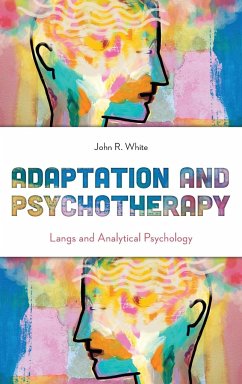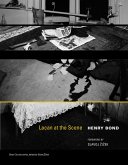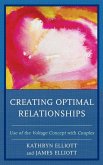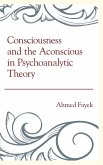- Gebundenes Buch
- Merkliste
- Auf die Merkliste
- Bewerten Bewerten
- Teilen
- Produkt teilen
- Produkterinnerung
- Produkterinnerung
A development of Robert Langs' adaptive paradigm and an expansion of clinical theory and technique that is valuable for both Freudian and Jungian analysts.
Andere Kunden interessierten sich auch für
![A Depth Psychology Model of Immigration and Adaptation A Depth Psychology Model of Immigration and Adaptation]() Phyllis Marie JensenA Depth Psychology Model of Immigration and Adaptation186,99 €
Phyllis Marie JensenA Depth Psychology Model of Immigration and Adaptation186,99 €![Lacan at the Scene Lacan at the Scene]() Henry BondLacan at the Scene17,99 €
Henry BondLacan at the Scene17,99 €![Divorce Divorce]() Divorce120,99 €
Divorce120,99 €![Erik Erikson's Verbal Portraits Erik Erikson's Verbal Portraits]() Donald CappsErik Erikson's Verbal Portraits125,99 €
Donald CappsErik Erikson's Verbal Portraits125,99 €![Creating Optimal Relationships Creating Optimal Relationships]() Kathryn ElliottCreating Optimal Relationships130,99 €
Kathryn ElliottCreating Optimal Relationships130,99 €![Consciousness and the Aconscious in Psychoanalytic Theory Consciousness and the Aconscious in Psychoanalytic Theory]() Ahmed FayekConsciousness and the Aconscious in Psychoanalytic Theory110,99 €
Ahmed FayekConsciousness and the Aconscious in Psychoanalytic Theory110,99 €![The Role of the Patient-Analyst Match in the Process and Outcome of Psychoanalysis The Role of the Patient-Analyst Match in the Process and Outcome of Psychoanalysis]() Judy Leopold KantrowitzThe Role of the Patient-Analyst Match in the Process and Outcome of Psychoanalysis187,99 €
Judy Leopold KantrowitzThe Role of the Patient-Analyst Match in the Process and Outcome of Psychoanalysis187,99 €-
-
-
A development of Robert Langs' adaptive paradigm and an expansion of clinical theory and technique that is valuable for both Freudian and Jungian analysts.
Hinweis: Dieser Artikel kann nur an eine deutsche Lieferadresse ausgeliefert werden.
Hinweis: Dieser Artikel kann nur an eine deutsche Lieferadresse ausgeliefert werden.
Produktdetails
- Produktdetails
- Verlag: Rowman & Littlefield Publishers
- Seitenzahl: 184
- Erscheinungstermin: 25. Januar 2023
- Englisch
- Abmessung: 235mm x 157mm x 15mm
- Gewicht: 426g
- ISBN-13: 9781538117934
- ISBN-10: 1538117932
- Artikelnr.: 60015811
- Herstellerkennzeichnung
- Libri GmbH
- Europaallee 1
- 36244 Bad Hersfeld
- gpsr@libri.de
- Verlag: Rowman & Littlefield Publishers
- Seitenzahl: 184
- Erscheinungstermin: 25. Januar 2023
- Englisch
- Abmessung: 235mm x 157mm x 15mm
- Gewicht: 426g
- ISBN-13: 9781538117934
- ISBN-10: 1538117932
- Artikelnr.: 60015811
- Herstellerkennzeichnung
- Libri GmbH
- Europaallee 1
- 36244 Bad Hersfeld
- gpsr@libri.de
John R. White, PhD, LPC is a psychoanalyst in private practice in Philadelphia. He received his philosophy PhD in 1993 from The International Academy of Philosophy, in the Principality of Liechtenstein, an institute accredited through the Austrian university system. He has more than 25 published articles and book reviews as well as a good deal of editing experience in philosophy. He became a licensed mental health counselor and Jungian psychoanalyst with a degree from the Interregional Society of Jungian Analysts.
Acknowledgements
Preface
Introduction
Chapter 1: On Psyche and Adaptation
Introduction
The Notion of "Psyche" in Early Analytic Theory
Jung's "Basic Postulates": The Reality of the Psyche
Understanding the "Unconscious"
On Clinical Interaction or, How Max Scheler was Ahead of His Time
Conclusion
Chapter 2: Adaptation in the Early Analytic Tradition
Introduction
Sigmund Freud
Adaptation in Ego Psychology: Heinz Hartmann
Conclusion
Chapter 3: Robert Langs and Adaptation in Clinical Practice
Introduction
Original Development of Adaptation and the "Adaptive Context"
Central Ideas Derived from Langs' Understanding of Adaptation
Rearticulating the Analytic Relationship
The "Reality" of Therapy Includes the Therapeutic Frame
The Communicative Fields
Unconscious Communication and Analytic Listening
Two Types of Derivative Communication
Critical Considerations of Langs' Theory of Unconscious Communication
Clinical Illustration
Clinical Example
Summary
Excursus: Final Phase: Adaptation and Death Anxiety
Conclusion
Chapter 4: Adaptation in Carl Jung
Introduction
The Concept of "Adaptation" in Jung
On Psychic Energy
Theoretical Assumptions
Progression and Regression of Libido
Langs and Jung
Adaptation in Clinical Practice
Returning to Bruce
Clarifying Adaptation in Jung
Conclusion
Chapter 5: Adaptation and Clinical Technique
Introduction
What is and What is the Value of Clinical Technique?
What Langs and Jung Share
How Langs and Jung Might Supplement Each Other
Incompatibilities between Langs and Jung
Understanding Symbols
Individual and Collective
Adaptation, Clinical Interaction, and Ethics
Conclusion
References
Index
About the Author
Preface
Introduction
Chapter 1: On Psyche and Adaptation
Introduction
The Notion of "Psyche" in Early Analytic Theory
Jung's "Basic Postulates": The Reality of the Psyche
Understanding the "Unconscious"
On Clinical Interaction or, How Max Scheler was Ahead of His Time
Conclusion
Chapter 2: Adaptation in the Early Analytic Tradition
Introduction
Sigmund Freud
Adaptation in Ego Psychology: Heinz Hartmann
Conclusion
Chapter 3: Robert Langs and Adaptation in Clinical Practice
Introduction
Original Development of Adaptation and the "Adaptive Context"
Central Ideas Derived from Langs' Understanding of Adaptation
Rearticulating the Analytic Relationship
The "Reality" of Therapy Includes the Therapeutic Frame
The Communicative Fields
Unconscious Communication and Analytic Listening
Two Types of Derivative Communication
Critical Considerations of Langs' Theory of Unconscious Communication
Clinical Illustration
Clinical Example
Summary
Excursus: Final Phase: Adaptation and Death Anxiety
Conclusion
Chapter 4: Adaptation in Carl Jung
Introduction
The Concept of "Adaptation" in Jung
On Psychic Energy
Theoretical Assumptions
Progression and Regression of Libido
Langs and Jung
Adaptation in Clinical Practice
Returning to Bruce
Clarifying Adaptation in Jung
Conclusion
Chapter 5: Adaptation and Clinical Technique
Introduction
What is and What is the Value of Clinical Technique?
What Langs and Jung Share
How Langs and Jung Might Supplement Each Other
Incompatibilities between Langs and Jung
Understanding Symbols
Individual and Collective
Adaptation, Clinical Interaction, and Ethics
Conclusion
References
Index
About the Author
Acknowledgements
Preface
Introduction
Chapter 1: On Psyche and Adaptation
Introduction
The Notion of "Psyche" in Early Analytic Theory
Jung's "Basic Postulates": The Reality of the Psyche
Understanding the "Unconscious"
On Clinical Interaction or, How Max Scheler was Ahead of His Time
Conclusion
Chapter 2: Adaptation in the Early Analytic Tradition
Introduction
Sigmund Freud
Adaptation in Ego Psychology: Heinz Hartmann
Conclusion
Chapter 3: Robert Langs and Adaptation in Clinical Practice
Introduction
Original Development of Adaptation and the "Adaptive Context"
Central Ideas Derived from Langs' Understanding of Adaptation
Rearticulating the Analytic Relationship
The "Reality" of Therapy Includes the Therapeutic Frame
The Communicative Fields
Unconscious Communication and Analytic Listening
Two Types of Derivative Communication
Critical Considerations of Langs' Theory of Unconscious Communication
Clinical Illustration
Clinical Example
Summary
Excursus: Final Phase: Adaptation and Death Anxiety
Conclusion
Chapter 4: Adaptation in Carl Jung
Introduction
The Concept of "Adaptation" in Jung
On Psychic Energy
Theoretical Assumptions
Progression and Regression of Libido
Langs and Jung
Adaptation in Clinical Practice
Returning to Bruce
Clarifying Adaptation in Jung
Conclusion
Chapter 5: Adaptation and Clinical Technique
Introduction
What is and What is the Value of Clinical Technique?
What Langs and Jung Share
How Langs and Jung Might Supplement Each Other
Incompatibilities between Langs and Jung
Understanding Symbols
Individual and Collective
Adaptation, Clinical Interaction, and Ethics
Conclusion
References
Index
About the Author
Preface
Introduction
Chapter 1: On Psyche and Adaptation
Introduction
The Notion of "Psyche" in Early Analytic Theory
Jung's "Basic Postulates": The Reality of the Psyche
Understanding the "Unconscious"
On Clinical Interaction or, How Max Scheler was Ahead of His Time
Conclusion
Chapter 2: Adaptation in the Early Analytic Tradition
Introduction
Sigmund Freud
Adaptation in Ego Psychology: Heinz Hartmann
Conclusion
Chapter 3: Robert Langs and Adaptation in Clinical Practice
Introduction
Original Development of Adaptation and the "Adaptive Context"
Central Ideas Derived from Langs' Understanding of Adaptation
Rearticulating the Analytic Relationship
The "Reality" of Therapy Includes the Therapeutic Frame
The Communicative Fields
Unconscious Communication and Analytic Listening
Two Types of Derivative Communication
Critical Considerations of Langs' Theory of Unconscious Communication
Clinical Illustration
Clinical Example
Summary
Excursus: Final Phase: Adaptation and Death Anxiety
Conclusion
Chapter 4: Adaptation in Carl Jung
Introduction
The Concept of "Adaptation" in Jung
On Psychic Energy
Theoretical Assumptions
Progression and Regression of Libido
Langs and Jung
Adaptation in Clinical Practice
Returning to Bruce
Clarifying Adaptation in Jung
Conclusion
Chapter 5: Adaptation and Clinical Technique
Introduction
What is and What is the Value of Clinical Technique?
What Langs and Jung Share
How Langs and Jung Might Supplement Each Other
Incompatibilities between Langs and Jung
Understanding Symbols
Individual and Collective
Adaptation, Clinical Interaction, and Ethics
Conclusion
References
Index
About the Author








